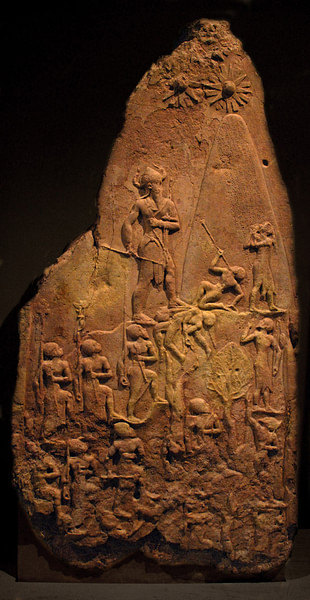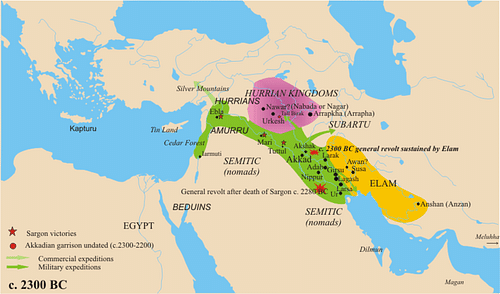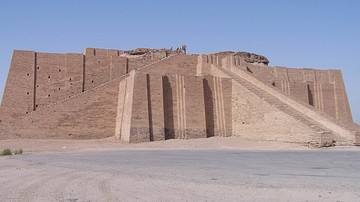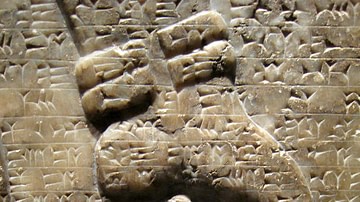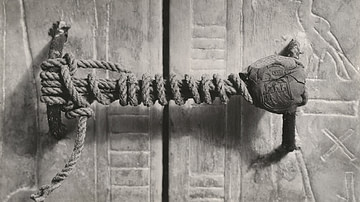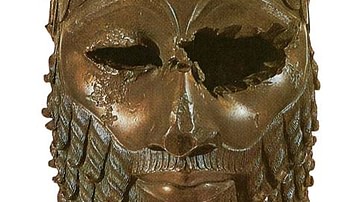The Curse of Agade is a story dated to the Ur III Period of Mesopotamia (2047-1750 BCE) though thought to be somewhat older in origin. It tells the story of the Akkadian king Naram-Sin (r. 2261-2224 BCE) and his confrontation with the gods, particularly the god Enlil.
Naram-Sin is considered the most important ruler of the Akkadian Empire after its founder (his grandfather) Sargon the Great (r. 2334-2279 BCE). He enlarged the boundaries of the empire and increased it in power, prestige, and military strength. He and his grandfather became the subject of many tales and legends down through the centuries and their stories were among the most popular throughout Mesopotamia. When King Ashurbanipal of Assyria collected his famous library at Nineveh in the 7th century BCE, he had brought to him all the written works that could be found throughout his empire; and these included the stories of the Akkadian kings.
Background
The Curse of Agade is part of a Mesopotamian literary genre known as "naru literature" which features a famous person (usually a king) from history as the main character in a didactic tale which most often concerned humanity's relationship with the gods. These tales are not historical or, at least, would be considered quasi-historical. The story known as The Great Revolt, for example, is probably based on an uprising which took place early in Naram-Sin's reign but does not relate those events factually and the same is true of the tale which has come to be known as The Cutha Legend, also dealing with Naram-Sin. Along with these tales, and others, later generations would associate Naram-Sin with The Curse of Agade.
It tells the story of the destruction of the city of Akkad by the will of the gods owing to Naram-Sin's impiety. It also very interestingly addresses the problem of seemingly meaningless suffering in its depiction of Naram-Sin's attempt to wrest a reason for his misery from the gods by force.
According to the text, the great Sumerian god Enlil withdrew his pleasure from the city of Akkad and, in so doing, prohibited the other gods from entering the city and blessing it any longer with their presence. Naram-Sin does not know what he could have done to incur this displeasure and so prays, asks for signs and omens, and falls into a seven-year depression as he waits for an answer from the god.
Finally, tired of waiting, and enraged that he has received no answer, he draws up his army and marches on Enlil's temple at the Ekur in the city of Nippur which he destroys. He "sets his spades against its roots, his axes against the foundations until the temple, like a dead soldier, falls prostrate" (Leick, The Invention of the City, 106). This attack, of course, provokes the wrath not only of Enlil but of the other gods who send the Gutium "a people who know no inhibition, with human instincts but canine intelligence and with monkey features" (106) to invade Akkad and lay it waste.
There is widespread famine after the invasion of the Gutians, the dead remain rotting in the streets and houses, and the city is in ruin and so, according to the tale, ends the city of Akkad and the Akkadian Empire, a victim of one king's arrogance in the face of the gods.
There is, however, no historical record of Naram-Sin ever reducing the Ekur at Nippur by force nor destroying the temple of Enlil and it is thought that The Curse of Agade was a much later piece written to express "an ideological concern for the right relationship between the gods and the absolute monarch" (Leick, 107) whose author chose Akkad and Naram-Sin as subjects because of their, by then, legendary status.
According to the historical record, Naram-Sin honored the gods and was actually quite pious. Naru literature was a very popular genre in Mesopotamia, however, and often, it seems, the version of the past these stories presented came to be accepted as actual history.
Although The Curse of Agade does address the proper relationship between the gods and the king, it also poses a problem regarding suffering and the will of the gods which it never answers: Why did Enlil withdraw his pleasure from the city in the first place and why, when Naram-Sin petitions the gods for an answer for seven years, does he receive none? The well-honed craft of the anonymous ancient writer is evident in the text in that no answer is given to these questions just as, in life, no answer is ever satisfactory in dealing with a reason for human suffering.
Enlil withdraws his pleasure and protection from the city because he wants to; no other reason is given. This is a completely different scenario from the biblical Book of Job in which God allows Satan to destroy Job's life to win a bet. Enlil is under no such pressure and could have as easily left Akkad alone to continue to flourish. Some scholars, such as Jeremy Black, have interpreted Enlil's displeasure as his refusal to acknowledge Naram-Sin as the legitimate king. According to Black, Enlil invested Akkad with his grace under the reign of Sargon and would recognize the legitimacy of no other. According to the story, however, Naram-Sin is in no position to know this.
Introduction & the Displeasure of Enlil
The tale begins with the idyllic life in the city of Akkad, with all of the riches of the region flowing in through its gates, until lines 56-65 where the first transition comes. The line, "As if she were a citizen there, she could not restrain her desire to prepare the ground for a temple (line 56) means that Inanna, recognizing all the riches at Akkad's disposal, felt she and the other gods should be honored and have a share in these fortunes - just as a pious citizen of the city would feel.
In the next line, however, one learns that "the statement coming from the Ekur was disquieting" meaning that Enlil did not feel this same way about the situation and did not give approval for the temple to be built, signifying his displeasure with Akkad. The reason for this displeasure, as previously noted, is never given but Professor Black's interpretation is probably the correct one: there could be only one legitimate king and Enlil would not accept Naram-Sin in that position.
When the story begins, Enlil has destroyed the powerful southern city of Kish (given as `Kis' below), subdued the country, and chosen Sargon to rule the whole of Mesopotamia "from the south as far as the highlands" (line 5). Inanna, who was Sargon's protector and patron goddess, establishes her home in Akkad to watch over her warrior-king. There is no mention of any disturbances when rule passes from Sargon to Naram-Sin and so, like the king himself, a reader is left with no answer as to why Enlil withdrew his blessings from the city.
Naram-Sin's Destruction of Enlil's Temple
In a dream, Naram-Sin sees that Akkad's future is bleak and so imposes upon himself a period of mourning and prayer. For seven years he remains in this penitential state waiting for an answer and then he takes matters into his own hands. If the gods will not come and answer him, he will go to them and force them to answer.
The gods of Mesopotamia were thought to literally live in the temples of the cities. When Naram-Sin destroys the Ekur, he is destroying Enlil's actual house, not just a symbolic house of worship. Lines 127-128 of the story read, "The people could see the bedchamber, its room which knows no daylight. The Akkadians could look into the holy treasure chest of the gods." This was beyond sacrilege; this was the intentional destruction and desecration of a god's house, of his home, from which his personal belongings were then stolen.
So great was the rage and frustration of Naram-Sin over the silence of the god that he engaged in the most unforgivable kinds of actions. In destroying the Ekur, however, he only incurs more wrath as the other gods now align themselves with Enlil and, in an effort to save the rest of the land from the famine and the Gutians, curse Akkad and cause it to become desolate.
Aside from the right relationship between the gods and a king, the story would also have warned against taking up arms against the gods - whether physically or spiritually - in that one was entering a battle one could not possibly win.
The following translation of The Curse of Agade is from an Old Babylonian manuscript of the earlier work. The story was very popular and "it was widely copied in Old Babylonian schools" (Black, 118). Akkad is given as 'Agade' (as it was also known outside of the story), Naram-Sin is given as 'Naram-Suen', and the question marks (?) indicate sections where a word is missing or another translation of the line is possible.
The Curse of Agade
1-9 After Enlil's frown had slain Kis as if it were the Bull of Heaven, had slaughtered the house of the land of Unug in the dust as if it were a mighty bull, and then Enlil had given the rulership and kingship from the south as far as the highlands to Sargon, king of Agade — at that time, holy Inana established the sanctuary of Agade as her celebrated woman's domain; she set up her throne in Ulmac.
10-24 Like a young man building a house for the first time, like a girl establishing a woman's domain, holy Inana did not sleep as she ensured that the warehouses would be provisioned; that dwellings would be founded in the city; that its people would eat splendid food; that its people would drink splendid beverages; that those bathed for holidays would rejoice in the courtyards; that the people would throng the places of celebration; that acquaintances would dine together; that foreigners would cruise about like unusual birds in the sky; that even Marhaci would be re-entered on the tribute rolls; that monkeys, mighty elephants, water buffalo, exotic animals, as well as thoroughbred dogs, lions, mountain ibexes, and alum sheep with long wool would jostle each other in the public squares.
25-39 She then filled Agade's stores for emmer wheat with gold, she filled its stores for white emmer wheat with silver; she delivered copper, tin, and blocks of lapis lazuli to its granaries and sealed its silos from outside. She endowed its old women with the gift of giving counsel, she endowed its old men with the gift of eloquence. She endowed its young women with the gift of entertaining, she endowed its young men with martial might, she endowed its little ones with joy. The nursemaids who cared for the general's children played the aljarsur instruments. Inside the city tigi drums sounded; outside it, flutes and zamzam instruments. Its harbour where ships moored was full of joy. All foreign lands rested contentedly, and their people experienced happiness.
40-56 Its king, the shepherd Naram-Suen, rose as the daylight on the holy throne of Agade. Its city wall, like a mountain, reached the heavens. It was like the Tigris going to the sea as holy Inana opened the portals of its city-gates and made Sumer bring its own possessions upstream by boats. The highland Martu, people ignorant of agriculture, brought spirited cattle and kids for her. The Meluhans, the people of the black land, brought exotic wares up to her. Elam and Subir loaded themselves with goods for her as if they were packasses. All the governors, the temple administrators, and the accountants of the Gu-edina regularly supplied the monthly and New Year offerings. What a weariness all these caused at Agade's city gates! Holy Inana could hardly receive all these offerings. As if she were a citizen there, she could not restrain (?) the desire (?) to prepare the ground for a temple.
57-65 But the statement coming from the E-kur was disquieting. Because of Enlil (?) all Agade was reduced (?) to trembling, and terror befell Inana in Ulmac. She left the city, returning to her home. Holy Inana abandoned the sanctuary of Agade like someone abandoning the young women of her woman's domain. Like a warrior hurrying to arms, she removed the gift of battle and fight from the city and handed them over to the enemy.
66-76 Not even five or ten days had passed and Ninurta brought the jewels of rulership, the royal crown, the emblem and the royal throne bestowed on Agade, back into his E-cumeca. Utu took away the eloquence of the city. Enki took away its wisdom. An took up into the midst of heaven its fearsomeness that reaches heaven. Enki tore out its well-anchored holy mooring pole from the abzu. Inana took away its weapons.
77-82 The life of Agade's sanctuary was brought to an end as if it had been only the life of a tiny carp in the deep waters, and all the cities were watching it. Like a mighty elephant, it bent its neck to the ground while they all raised their horns like mighty bulls. Like a dying dragon, it dragged its head on the earth and they jointly deprived it of honour as in a battle.
83-93 Naram-Suen saw in a nocturnal vision that Enlil would not let the kingdom of Agade occupy a pleasant, lasting residence, that he would make its future altogether unfavourable, that he would make its temples shake and would scatter its treasures. He realized what the dream was about, but did not put into words, and did not discuss it with anyone. Because of the E-kur, he put on mourning clothes, covered his chariot with a reed mat, tore the reed canopy off his ceremonial barge and gave away his royal paraphernalia. Naram-Suen persisted for seven years! Who has ever seen a king burying his head in his hands for seven years?
94-99 Then he went to perform extispicy on a kid regarding the temple, but the omen had nothing to say about the building of the temple. For a second time he went to perform extispicy on a kid regarding the temple, but the omen again had nothing to say about the building of the temple. In order to change what had been inflicted (?) upon him, he tried to alter Enlil's pronouncement.
100-119 Because his subjects were dispersed, he now began a mobilization of his troops. Like a wrestler who is about to enter the great courtyard, he...his hands towards (?) the E-kur. Like an athlete bent to start a contest, he treated the giguna as if it were worth only thirty shekels. Like a robber plundering the city, he set tall ladders against the temple. To demolish E-kur as if it were a huge ship, to break up its soil like the soil of mountains where precious metals are mined, to splinter it like the lapis lazuli mountain, to prostrate it, like a city inundated by Ickur. Though the temple was not a mountain where cedars are felled, he had large axes cast, he had double-edged agasilig axes sharpened to be used against it. He set spades against its roots and it sank as low as the foundation of the Land. He put axes against its top, and the temple, like a dead soldier, bowed its neck before him, and all the foreign lands bowed their necks before him.
120-148 He ripped out its drain pipes, and all the rain went back to the heavens. He tore off its upper lintel and the Land was deprived of its ornament. From its "Gate from which grain is never diverted", he diverted grain, and the Land was deprived of grain. He struck the "Gate of Well-Being" with the pickaxe, and well-being was subverted in all the foreign lands. As if they were for great tracts of land with wide carp-filled waters, he cast large spades to be used against the E-kur. The people could see the bedchamber, its room which knows no daylight. The Akkadians could look into the holy treasure chest of the gods. Though they had committed no sacrilege, its lahama deities of the great pilasters standing at the temple were thrown into the fire by Naram-Suen. The cedar, cypress, juniper and boxwood, the woods of its giguna, were...by him. He put its gold in containers and put its silver in leather bags. He filled the docks with its copper, as if it were a huge transport of grain. The silversmiths were re-shaping its silver, jewellers were re-shaping its precious stones, smiths were beating its copper. Large ships were moored at the temple, large ships were moored at Enlil's temple and its possessions were taken away from the city, though they were not the goods of a plundered city. With the possessions being taken away from the city, good sense left Agade. As the ships moved away from the docks, Agade's intelligence was removed.
149-175 Enlil, the roaring (?) storm that subjugates the entire land, the rising deluge that cannot be confronted, was considering what should be destroyed in return for the wrecking of his beloved E-kur. He lifted his gaze towards the Gubin mountains, and made all the inhabitants of the broad mountain ranges descend (?). Enlil brought out of the mountains those who do not resemble other people, who are not reckoned as part of the Land, the Gutians, an unbridled people, with human intelligence but canine instincts and monkeys' features. Like small birds they swooped on the ground in great flocks. Because of Enlil, they stretched their arms out across the plain like a net for animals. Nothing escaped their clutches, no one left their grasp. Messengers no longer travelled the highways, the courier's boat no longer passed along the rivers. The Gutians drove the trusty (?) goats of Enlil out of their folds and compelled their herdsmen to follow them, they drove the cows out of their pens and compelled their cowherds to follow them. Prisoners manned the watch. Brigands occupied the highways. The doors of the city gates of the Land lay dislodged in mud, and all the foreign lands uttered bitter cries from the walls of their cities. They established gardens for themselves within the cities, and not as usual on the wide plain outside. As if it had been before the time when cities were built and founded, the large arable tracts yielded no grain, the inundated tracts yielded no fish, the irrigated orchards yielded no syrup or wine, the thick clouds (?) did not rain, the macgurum plant did not grow.
176-192 In those days, oil for one shekel was only half a litre, grain for one shekel was only half a litre, wool for one shekel was only one mina, fish for one shekel filled only one ban measure — these sold at such prices in the markets of the cities! Those who lay down on the roof, died on the roof; those who lay down in the house were not buried. People were flailing at themselves from hunger. By the Ki-ur, Enlil's great place, dogs were packed together in the silent streets; if two men walked there they would be devoured by them, and if three men walked there they would be devoured by them. Noses were punched (?), heads were smashed (?), noses (?) were piled up, heads were sown like seeds. Honest people were confounded with traitors, heroes lay dead on top of heroes, the blood of traitors ran upon the blood of honest men.
193-209 At that time, Enlil rebuilt his great sanctuaries into small reed (?) sanctuaries and from east to west he reduced their storehouses. The old women who survived those days, the old men who survived those days and the chief lamentation singer who survived those years set up seven balaj drums, as if they stood at the horizon, and together with drums made them resound to Enlil like Ickur for seven days and seven nights. The old women did not restrain the cry "Alas for my city!". The old men did not restrain the cry "Alas for its people!". The lamentation singer did not restrain the cry "Alas for the E-kur!". Its young women did not restrain from tearing their hair. Its young men did not restrain from sharpening their knives. Their laments were as if Enlil's ancestors were performing a lament in the awe-inspiring Holy Mound by the holy knees of Enlil. Because of this, Enlil entered his holy bedchamber and lay down fasting.
210-221 At that time, Suen, Enki, Inana, Ninurta, Ickur, Utu, Nuska, and Nisaba, the great gods cooled Enlil's heart with cool water and prayed to him: "Enlil, may the city that destroyed your city, be treated as your city has been treated! May the one that defiled your giguna, be treated as Nibru! In this city, may heads fill the wells! May no one find his acquaintances there, may brother not recognize brother! May its young woman be cruelly killed in her woman's domain, may its old man cry in distress for his slain wife! May its pigeons moan on their window ledges, may its small birds be smitten in their nooks, may it live in constant anxiety like a timid pigeon!"
222-244 Again, Suen, Enki, Inana, Ninurta, Ickur, Utu, Nuska and Nisaba, all the gods whosoever, turned their attention to the city, and cursed Agade severely: "City, you pounced on E-kur: it is as if you had pounced on Enlil! Agade, you pounced on E-kur: it is as if you had pounced on Enlil! May your holy walls, to their highest point, resound with mourning! May your giguna be reduced to a pile of dust! May your pilasters with the standing lahama deities fall to the ground like tall young men drunk on wine! May your clay be returned to its abzu, may it be clay cursed by Enki! May your grain be returned to its furrow, may it be grain cursed by Ezinu! May your timber be returned to its forest, may it be timber cursed by Ninilduma! May the cattle slaughterer slaughter his wife, may your sheep butcher butcher his child! May water wash away your pauper as he is looking for...! May your prostitute hang herself at the entrance to her brothel! May your pregnant (?) hierodules and cult prostitutes abort (?) their children! May your gold be bought for the price of silver, may your silver be bought for the price of pyrite (?), and may your copper be bought for the price of lead!"
245-255 "Agade, may your strong man be deprived of his strength, so that he will be unable to lift his sack of provisions and...will not have the joy of controlling your superior asses; may he lie idle all day! May this make the city die of hunger! May your citizens, who used to eat fine food, lie hungry in the grass and herbs, may your...man eat the coating on his roof, may he chew (?) the leather hinges on the main door of his father's house! May depression descend upon your palace, built for joy! May the evils of the desert, the silent place, howl continuously!"
256-271 "May foxes that frequent ruin mounds brush with their tails your fattening-pens (?), established for purification ceremonies! May the ukuku, the bird of depression, make its nest in your gateways, established for the Land! In your city that could not sleep because of the tigi drums, that could not rest from its joy, may the bulls of Nanna that fill the pens bellow like those who wander in the desert, the silent place! May the grass grow long on your canal-bank tow-paths, may the grass of mourning grow on your highways laid for waggons! Moreover, may...wild rams (?) and alert snakes of the mountains allow no one to pass on your tow-paths built up with canal sediment! In your plains where fine grass grows, may the reed of lamentation grow! Agade, may brackish water flow where fresh water flowed for you! If someone decides, "I will dwell in this city!", may he not enjoy the pleasures of a dwelling place! If someone decides, "I will rest in Agade!", may he not enjoy the pleasures of a resting place!"
272-280 And before Utu on that very day, so it was! On its canal bank tow-paths, the grass grew long. On its highways laid for waggons, the grass of mourning grew. Moreover, on its tow-paths built up with canal sediment...wild rams (?) and alert snakes of the mountains allowed no one to pass. On its plains, where fine grass grew, now the reeds of lamentation grew. Agade's flowing fresh water flowed as brackish water. When someone decided, "I will dwell in that city!", he could not enjoy the pleasures of a dwelling place. When someone decided, "I will rest in Agade!", he could not enjoy the pleasures of a resting place!
281 Inana be praised for the destruction of Agade!
